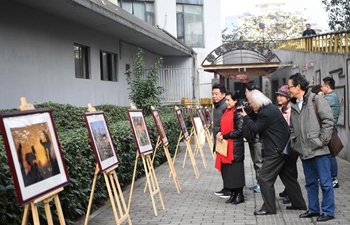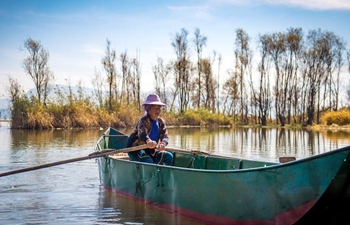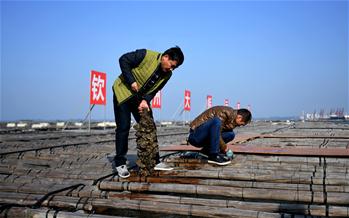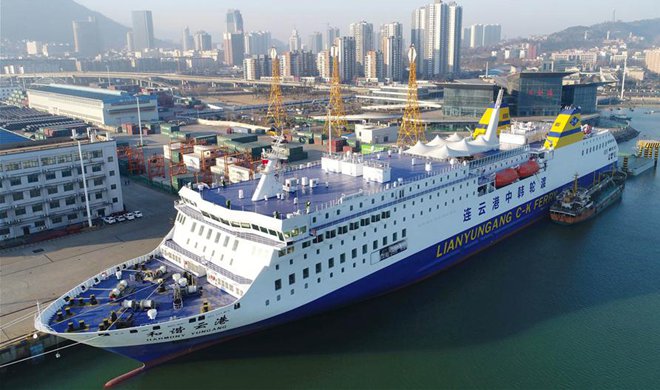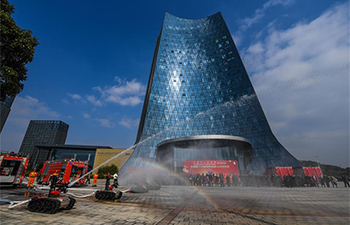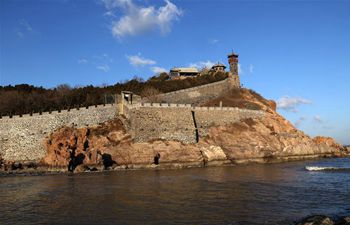by Burak Akinci
ANKARA, Dec. 19 (Xinhua) -- As the war in neighboring Syria drags on and will enter soon its seventh year with no tangible breakthrough in peace talks, the record 3.3 million Syrian refugees Turkey is hosting has become a harsh reality it has to deal with.
The majority of Syrians who fled to Turkey are happy to be in the country and have no intention or limited intention to return, according to a recent extensive survey by prominent refugee experts.
According to the latest figures, an average of 306 babies are born from the 3.3 million registered Syrians in Turkey every day.
Meanwhile, among the scattered Syrian refugees across Turkey, only 7 percent live in camps established in towns near the Syrian border in decent conditions.
"Our research shows despite all the difficulties, 50 percent of Syrians say they are happy. And this figure is quite high. So, at least 50 percent have no motivation at all to go back," said Murat Erdogan, a leading author of the survey and the director of the Turkish German University's Migration and Integration Research Center.
Another recent survey conducted jointly by the IPSOS research center and the Humanitarian Foundation for Development (INGEV), confirms this trend.
According to its results, when asked about their future expectations, 52 percent said they are optimistic about them and their families' future in Turkey.
Turkey hosts the largest number of refugees in the world but it doesn't define or call them "refugees," which would imply giving them the rights by international conventions and regulations.
Turkish President Recep Tayyip Erdogan repeated on Monday, also the International Migrants Day, that his country's policy of open doors" to refugees was still in effect despite some social and integration problems encountered by the mass Syrian migrant community.
"We have spent 30 billion U.S. dollars in the last seven years for the refugees that came to our country fleeing the war in their country's," he said in a speech in Ankara.
Besides the 3.3 million Syrian refugees, Turkey is also home to over 320,000 asylum seekers from other countries, such as Iran, Iraq and Afghanistan.
"Citizens in countries in turmoil have always turned to Anatolia. We have always opened our hearts to them and accepted them," Erdogan added.
He again denounced the scarcity of international funding for his country to manage the refugee crisis.
The Syrian civil war remains the largest single cause of displacement, with 12 million people (around two-thirds of the population) either uprooted in the war-torn country or fleeing abroad.
Despite the international applause of Turkey's efforts to host millions of people fleeing from a disastrous conflict that has claimed tens of thousands of lives and reduced a country into rubble, the lack of a solid refugee strategy is what experts all worry about.
"There is a confusion inside the government on how to address the problem. There is a will but the ways of dealing with this complex issue are not there," Metin Corabatir, a leading researcher at the Research Center on Asylum and Migration (IGAM), told Xinhua.
According to the Turkish expert, integration is the only durable solution to the issue.
"Turkey has to face the reality that it must adopt a comprehensive strategy to integrate its refugees by giving them proper rights to be included in the labor market and the society," Corabatir said.
"It all depends on the terms and the timetable of a possible peace. But I believe people would want to go to their native country, to their homes since they will always be seen as foreigners in Turkey," Corabatir explained.
"Some of the families that we encounter say that their children could stay here but that they will return in case of a peaceful solution in Syria," added the expert.
Among youngsters, the trend is generally in favor of staying in Turkey, where they have established a new life without armed conflict and fear.
"My parents would definitely want to return to Aleppo where I and my brother were born, but we want to stay here to go to university if we can," Mohammed Sanaar, 17, who is studying in a state high school in Ankara where he has been living since 2013, told Xinhua.
Speaking fluent Turkish, he said "conditions are more favorable" for him and his younger brother here despite the fact that they live in a house packed with another Syrian family and benefit from aides.
The European Union provides financial assistance to the Syrians in Turkey in return for stopping the flow of immigrants from Turkish territories to the Greek islands and inland Europe, as part of a deal brokered in May last year.
The deal requires Brussels to deliver a total of 6 billion euros (7.08 billion U.S. dollars), but Ankara has criticized the EU for delaying the funds, while the European Commission recently responded by promising to fulfil its end before 2018.
On Monday, President Erdogan lashed again at the EU, saying "only 900 million euros have been transferred for projects in Turkey."
"We do not know whether there will be permanent peace in Syria. And even if the war were to stop, we simply don't know if we can reconstruct our life's back again there," Mohammed said.
"I see that people of my age are willing to stay here, while our parents long for returning home because integration is even more difficult for them," the Syrian teenager added.





